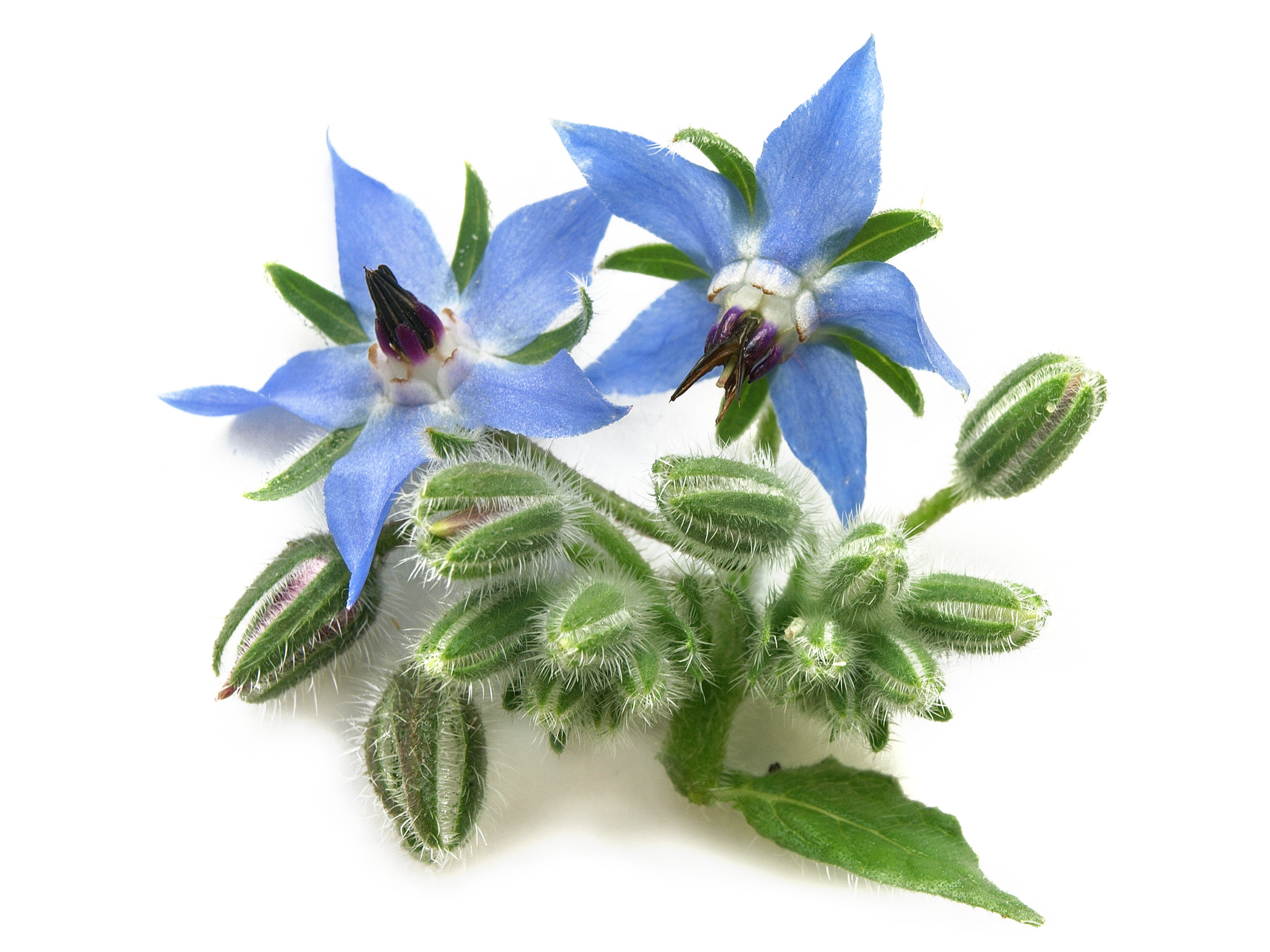What does borage oil do for skin?

Borage oil comes from the seeds of the plant Borago officinalis. This plant is also called the starflower plant because of its beautiful and distinctive blue star-shaped flowers. Borage is an annual herbal plant that grows wild and is also cultivated for medicinal and culinary uses.
Borage oil is highly valued because it is uniquely rich in gamma-Linolenic Acid (GLA), an omega-6 fatty acid. GLA is important for maintenance of skin health and barrier function. GLA is an essential fatty acid for skin because skin can not synthesize GLA and it must be provided through diet or application. Topical application of GLA has been shown to improve skin problems such as eczema, seborrheic dermatitis and other inflammatory skin problems associated with weakened skin barrier. Borage oil topical application improves the barrier weaknesses inherent in these skin problems, meaning the skin is less sensitive and trans epidermal water loss (TEWL) is reduced.
Where does borage oil come from:
Borage oil is derived from the seed of Borago officinalis. The plant grows in North Africa, Europe and Asia Minor. It has been naturalized in North America and grows wild in my Northern California garden during summer too. The beautiful blue starflower is edible, makes a beautiful addition to salads and a striking garnish that I love using. Modern commercial cultivation of borage seed oil comes from mainly from Canada, New Zealand and the UK.
What are the best botanical sources of gamma-Linolenic Acid (GLA)?
GLA is not unique to borage; other plants contain GLA including evening primrose and black currant but borage oil has the highest amount of gamma Linolenic Acid (GLA). GLA comes from vegetable oils and borage seed oil is the richest plant source of gamma-linolenic acid (GLA), providing twice the amount found in evening primrose.
Health Benefits of Borage Oil
Oral supplementation of borage oil has been found to aid in the treatment of internal diseases including obesity, rheumatoid arthritis, heart disease, premenstrual syndrome, cough, stroke, depression, asthma and diabetes. Ingestion of oral borage oil supplements can have side effects. These range from mild digestive side effects all the way to seizures. My preference is to use borage oil topically to treat skin conditions.
Borage oil's benefits for skin health include helping to seal skin moisture, maintain skin suppleness and fight skin inflammation.
Skin problems known to benefit from topical borage oil application include:
- Eczema
- Seborrheic dermatitis
- Acne
- Rosacea
- Psoriasis
I add to this list dry and sensitive skin, including photodamaged and aging skin! These wide ranging benefits of borage oil are why the world market value of borage oil is predicted to reach 61.6 million US dollars by 2027. (Globe Newswire, New York, March 16, 2020).

The world is catching on to what I’ve known for years about the skin benefits of borage oil. It's why I blended borage oil with my other favorite healing botanical oils to create my Omega-Enriched Booster Oil. Based on my 30+ years practicing dermatology, I am now able to capture the benefits of borage oil in a hypoallergenic botanical formulation made with organic ingredients to help fight some of the most common and vexing inflammatory skin problems. This is my ideal blending of science and nature for overall skin wellness. - Dermatologist Dr. Cynthia Bailey
What is the best way to use borage oil for skin problems?

The best way to use borage oil to treat skin problems is to apply high-quality borage oil blended and diluted with other botanical oils. Borage oil can also be made into nutritional supplements that you take by mouth but there are documented side effects and some are serious such as seizures. My preference is to use borage oil topically as in my Omega-Enriched Booster Oil. My Omega-Enriched Booster Oil can be used alone or by adding a few drops to a rich cream or lotion.
Oral borage oil has side effects and topical borage oil is readily absorbed by skin. As a dermatologist, I much prefer using topical borage oil to treat skin problems. - Dr. Cynthia Bailey
It is important to understand that your skin can’t make its own gamma-Linolenic Acid (GLA). Also, there is no substantial skin storage of GLA because the skin cells grow and use it up quickly. Your skin gets what GLA that it can from your liver, which produces GLA from the Linoleic Acid (LA) found in your diet. The liver enzyme which creates GLA from LA is slow and highly vulnerable to conditions such as aging, diabetes, high alcohol intake, stress and poor diets. This is concerning because GLA is really important for optimal skin structure and health.

My advice is to apply GLA-rich borage oil to sensitive skin areas such as the face to help boost skin barrier strength, keep skin supple and fight skin inflammation.
How does borage oil work to heal skin problems?
- The high content of GLA in borage oil is converted in your skin to prostaglandin E1 (PGE1) which reduces skin inflammation.
- The fatty acids in borage oil help replenish lipids in your skin's outer barrier structure.
- Borage oil also has antioxidant benefits for skin.
The best scientific evidence for borage oil's benefits to skin health come from studies on topical application. The results of scientific studies of oral borage supplements and skin health are mixed, include the potential for side effects and I’m not a fan. I prefer applying borage oil skin care products along with eating a healthy diet filled with fresh fruits, veggies, nuts, legumes and other plant sources of GLA – getting this anti-inflammatory fatty acid just as ‘mother nature’ intended.
What are the best ways to use borage oil for skin and hair?

Apply a product with organic high-quality borage oil. I don’t recommend applying pure essential borage oil straight to skin 'neat'. Like all essential oils, borage oil needs to be diluted and blended with other ingredients, preferably hypoallergenic and non-irritating botanical oils. My Omega Enriched Booster Oil is created with just the right amount of borage oil combined with other organic botanical healing oils. It is well tolerated by sensitive skin and can be applied directly to affected skin or a few drops can be added to any face or body cream. I created my Omega-Enriched Booster Oil with the correct amount of borage oil to benefit skin without risking the taunt of skin allergy or irritation.
References
Kanehara S., Ohtani T., Uede K., Furukawa F. Clinical effects of undershirts coated with borage oil on children with atopic dermatitis: A double-blind, placebo-controlled clinical trial. J. Dermatol. 2007;34:811–815. doi: 10.1111/j.1346-8138.2007.00391.x.
Lin TK, Zhong L, Santiago JL. Anti-Inflammatory and Skin Barrier Repair Effects of Topical Application of Some Plant Oils. Int J Mol Sci. 2017;19(1):70. Published 2017 Dec 27. doi:10.3390/ijms19010070
Tasset-Cuevas I, Fernández-Bedmar Z, Lozano-Baena MD, et al. Protective effect of borage seed oil and gamma linolenic acid on DNA: in vivo and in vitro studies. PLoS One. 2013;8(2):e56986. doi:10.1371/journal.pone.0056986
Horrobin, David F., Essential fatty acids in clinical dermatology, Journal of the American Academy of Dermatology, Volume 20, Issue 6, 1045 – 1053
Majid Asadi-Samani, Mahmoud Bahmani, Mahmoud Rafieian-Kopaei, The chemical composition, botanical characteristic and biological activities of Borago officinalis: a review, Asian Pacific Journal of Tropical Medicine, Volume 7, Supplement 1, September 2014, Pages S22-S28
McCusker MM1, Grant-Kels JM., Healing fats of the skin: the structural and immunologic roles of the omega-6 and omega-3 fatty acids., Clin Dermatol. 2010 Jul-Aug;28(4):440-51. doi: 10.1016/j.clindermatol.2010.03.020.
Essential Fatty Acids and Skin Health, Linus Pauling Institute, Oregon State University
